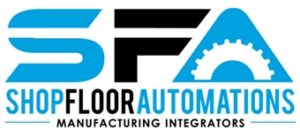One manufacturer with a 20-year-old CNC machine started having issues with its floppy drive corrupting and random file saves not working (and then later working). At the same time, they watched as the supply of floppy drive replacements available through eBay steadily decreased. Another manufacturer couldn’t determine how much time machines were broken down or when certain machines should be replaced over others. “At the same time,” explained their machine process engineer, “we wanted to get a full sense of our capacity.” Yet another manufacturer had problems connecting its HAAS machines to its programming computer with R232 serial cables.
What do all of these manufacturers have in common? They all possessed equipment challenges. And all of those challenges were resolved through their partnership with a connectivity expert: their manufacturing integrator.
The Link Between Your Machinery and Operations
A manufacturing integrator serves as the link between your machinery on the shop floor, internal IT as well as Managed Services IT support and your operators, engineers and programmers. An ideal integrator provides the extensive hardware, software, support and project management options to help keep aging and modern equipment productive, effective and profitable. They’re your single source to troubleshoot issues and roadmap new improvement initiatives.
There are distinctions that make a manufacturing integrator so valuable to today’s shop floors, of course. Here’s four of them:
- They’re experts in manufacturing equipment. The team at Shop Floor Automations (SFA), for example, has amassed a combined 100 years in CNC machinery experience. They have deep knowledge across a wide range of machines, which has been collected over 25 years. “The troubleshooting page on HAAS’s website wasn’t even as detailed as these guys [SFA] were,” reported the manufacturer with the R232 serial cabling issues.
- They have a wide range of available resources. Whether your existing IT infrastructure requires a LAN Connect device or you want to start capturing machine data to optimize Overall Equipment Effectiveness (OEE), a go-to manufacturing integrator should have the broad portfolio of solutions and support to put you on the right path forward.
- They’re time and cost-efficiency focused. Manufacturing integrators are skilled in identifying cost-saving opportunities, whether it’s related to how to phase a machine monitoring or DNC software implementation or the optimal set up time and steps involved with adding USB to CNC machines. And because of their technical expertise, they’re best suited to steer – or troubleshoot directly – issues to the most appropriate team. A manufacturing engineer in the oil and gas industry recalled their IT making changes that caused their DNC software to stop working on 20 machines. After calling SFA support, he was able to have the issue resolved remotely within three hours.
- They’re dialed into technological developments. They work closely with software publishers, hardware manufacturers and equipment manufacturers to keep ahead of the latest technological advancements in the industry. These relationships influence the documentation, training, recommendations and best practices that a manufacturing integrator designs to keep your machines profitable.

Manufacturing integrators are your single source to troubleshoot issues and roadmap new improvement initiatives.
Challenges Resolved
As a result of its collaboration with a professional manufacturing integrator, the manufacturer with floppy drive corruptions was able to swap its floppy drive for a Floppy Drive Emulator to eliminate its data failure and loss risk altogether. The other manufacturer seeking downtime visibility now reveals that, “We no longer rely on anecdotal evidence to understand the effects of machine downtime,” due to its implementation of the Scytec DataXchange machine monitoring solution. The manufacturer with HAAS machine connection troubles? Today its machines are running on the same network as its programming computer – wirelessly.
Learn how you can maximize your partnership with a trusted manufacturing integrator by contacting SFA today.


